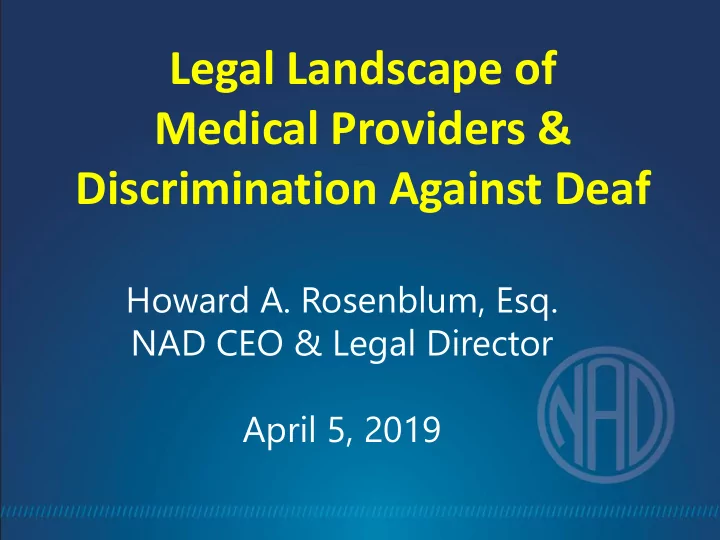

Legal Landscape of Medical Providers & Discrimination Against Deaf Howard A. Rosenblum, Esq. NAD CEO & Legal Director April 5, 2019
Legal Mandate for Effective Communication • Covered entities “shall furnish appropriate auxiliary aids and services where necessary to ensure effective communication with individuals with disabilities” • Auxiliary aids and services necessary “vary in accordance with the method of communication used by the individual; the nature, length, and complexity of the communication involved; and the context in which the communication is taking place.”
Legal Mandate for Effective Communication • “Qualified interpreters” = “interpreter who, via a video remote interpreting (VRI) service or an on-site appearance, is able to interpret effectively, accurately, and impartially, both receptively and expressively, using any necessary specialized vocabulary.
Legal Mandate for Effective Communication • “Undue burden” = “significant difficulty or expense. In determining whether an action would result in an undue burden, factors to be considered include –” • (1) The nature and cost of the action needed • (2) The overall financial resources; number of persons employed; effect on expenses and resources; legitimate safety requirements; or the impact otherwise upon operation; • (3) The separateness from any parent corporation or entity; • (4) The overall financial resources of any parent corporation or entity; and • (5) The type of operation of any parent corporation or entity.
Deaf Community’s Perspective • Rehab Act of 1973 and ADA of 1990 were supposed to bring equality • In many ways, closer to equality • Of all service providers, two are by far the worst in refusing interpreters: – Attorneys (and sometimes courts) – Doctors (and hospitals) • My theory? Out of pocket expenses are foreign to them • Deaf/Hard of Hearing/DeafBlind
History of the NAD & Legal Work • 1880 – NAD founded • 1966 – NAD has first staff and office • 1977 – NAD hires first lawyer • 1990 – NAD sues Maine Medical Ctr • 1995 – NAD sues St Elizabeth Hosp • 1996 – NAD sues Free State Health • 1996 – NAD sues Southwest Gen Hosp • 1996-97 – NAD sues PG Cnty Hsp (3X) • 1996&2000 – NAD sues Free State (2X) • 1998 – NAD sues Swedish Covenant
History of the NAD & Legal Work • 1998&14 – NAD sues Dr’s Cmnity (2X) • 1998 – NAD sues SUNY Health Science • 2000 – NAD sues Good Samaritan Hsp • 2006 – NAD sues UMD Medical • 2008&16 – NAD sues Upper Ches (2X) • 2008-12 – NAD sues Adventist (3X) • 2009 – NAD sues Walker Baptist MC • 2010 – NAD sues Chester River Health • 2011 – NAD sues Professional Health
History of the NAD & Legal Work • 2012 – NAD sues Advanced Walk-In • 2012 – NAD sues Martin County Hosp • 2012 – NAD sues Iredell Mem Hosp • 2014 – NAD sues NY Hosp/Queens • 2014 – NAD sues District Hosp Partners • 2015 – NAD sues Mountain States Hlth • 2016 – NAD sues Mercy Medical • 2017 – NAD sues Lifespan • 2018 – NAD sues Centura Health
DOJ Health Care Initiative • Began in 2012 • 47 Cases between 2012 and 2017 • 30 involving denial of communication at hospitals and doctors offices (64%) • Of the 30, 5 specifically mention deaf companions; 1 is deaf parent
Other Lawsuits against Doctors/Hospitals • Based on legal research, estimate of 180+ federal cases against doctors and hospitals since 1973 • Only represents small percentage of denial of effective communication cases against medical providers • Many deaf people try to resolve in other ways or do not bother
Typical Defenses of Hospitals/Doctors • Request not made (typically not recorded or lost in process) • Don’t know where to get an interpreter or family/friends can suffice • Undue Burden Myth: Cost of interpreter more than payment for visit • Insurance does not cover it • Patient can read and write English • Less than 15 people in office • “Signing” staff
Joint Commission Guidance • Joint Commission recognized the access problem and issued its “Advancing Effective Communication, Cultural Competence, and Patient- and Family-Centered Care: A Roadmap for Hospitals” in 2010 • Emphasized by Joint Commission that these were not new rules, but intended to help hospitals follow mandates • Problems remain
Language Access & Impact on Deaf • Hospitals began implementing language phone lines to provide comm access • VRI became the equivalent, without regulation • Instead of denying interpreters, now VRI is often offered as sole option • The GWUH story (representing many others)
Doctor’s Offices • Many outright refuse interpreters • Many refer deaf patients to other doctors • Many tell deaf patients to see them at hospital instead of office • Some hire “signing” staff • Some retain unqualified interpreters exclusively, and schedule deaf patients around interpreters’ availability
Other Issues • Rights of Companions who are Deaf • Charging costs of interpreters to insurance & deaf patients • Missed appointments and charging deaf patients • Qualifications of interpreters for serious medical issues
QUESTIONS? ???
Recommend
More recommend